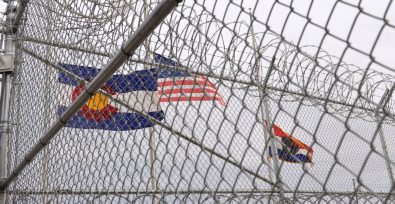In a historic move, five years ago, Colorado made a significant constitutional shift, taking a bold stance against slavery and involuntary servitude, even as a punitive measure for crime. This watershed moment, while symbolically powerful, has not translated into much change for incarcerated persons in Colorado prisons, as a new lawsuit reveals.
The penalties for not working
Shockingly, since 2019, over 14,000 individuals in Colorado have faced penalties for refusing to engage in forced labor. These penalties not only include additional work assignments but also extend to the loss of various privileges. Incarcerated workers, like Richard Lilgerose, have reported being moved to units with restricted access and losing “good time,” impacting their eligibility for parole.
“I was always anxious about having to go to the kitchen and work under these conditions for hours upon hours and not knowing when I was going to be able to go back to my unit to get some rest.”
Lilgerose, who now suffers from PTSD due to the chaos in the prison kitchen, has filed a lawsuit against the state for violating the amended constitution.
For NPR reports,
“The reality is that once people enter the prison gates, they lose the right to refuse to work,” says Jennifer Turner, a human rights researcher at the ACLU and the lead author on a report released last year on prison labor.
Most prison workers maintain the institutions where they’re held. In New York, prisoners also staff DMV call centers. In Michigan, they make license plates. In Louisiana, they serve lawmakers food. In North Carolina, they work on highway crews. In 14 states including California, prisoners fight wildfires. In Texas, some prison farms are located on the same land as former slave plantations.
Colorado used to sell goat cheese to Whole Foods, though the company stopped amid public outcry. In 2020, the state generated more than $6 million selling to around 100 private companies.
The battle continues
While Colorado’s amendment brought a measure of progress, the economic machinery driven by prison labor remains intact. Nationally, incarcerated workers contribute over $11 billion annually through the goods and services they produce. In most states, these workers are paid mere pennies an hour – in some states, they get nothing at all. Colorado passed a new law in 2022 making it mandatory that incarcerated workers employed by private external entities be paid the state minimum wage of roughly $13 an hour. Though the system needs vast improvement, Colorado has paved a way for incarcerated persons to seek remedy for what is essentially illegal mistreatment.
Persons in other states have no such recourse due to outdated legislation.
According to former Florida county commissioner, Warren Yeager, “There’s no way we can take care of our facilities, our roads, our ditches if we didn’t have inmate labor. … We could not tax our citizens enough to replace the value that the inmate labor contributes to our community.” He’s not alone. Many policymakers argue that dismantling the prison-forced labor system would be financially unfeasible – and some have turned down proposals to enact similar constitutional amendments for this very reason. But, as advocates point out, abolishing slavery met with the same argument centuries ago.
For years, the Freedom United community has been calling for an end to forced prison labor in the U.S. by amending the 13th Amendment of the U.S. Constitution to abolish slavery and involuntary servitude for good countrywide. We hope Colorado follows through with meaningful change in policy and practice to match its legislation just as we hope other states follow Colorado’s lead and change their constitutions.
Join the movement today. Sign the petition and stand up for freedom.







Freedom United is interested in hearing from our community and welcomes relevant, informed comments, advice, and insights that advance the conversation around our campaigns and advocacy. We value inclusivity and respect within our community. To be approved, your comments should be civil.